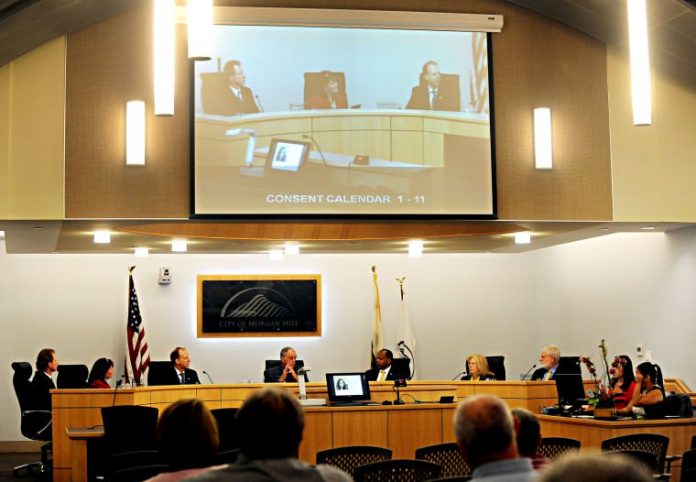A dejected Morgan Hill City Council declined to place a local revenue measure on the November ballot at Wednesday’s meeting, and warned residents they will have to accept degrading city streets until up to $5.8 million per year can be found to make repairs and upgrades.
The council’s decision July 27 followed a report from public opinion research consultants The Lew Edwards Group and Godbe Research, which presented survey results that indicate the voters would not support numerous ballot revenue measure options.
Guided by previous council discussions about the possible revenue measure, the survey gauged likely voters’ response to a variety of potential sales tax and bond measures. The results showed the highest support—59 percent of 398 respondents—for a three-quarter-cent sales tax measure, with the favorability rate declining with subsequent options that included sales taxes of smaller value and bond issue measures, according to Charles Hester of Godbe Research.
Hester said as an experienced pollster he would like to see the support percentage in the “low to mid-60s” before recommending placing anything on the ballot. He advised the council not to place a measure on the ballot this year based on these results.
“There is simply no support for additional taxes in Morgan Hill,” said Councilman Larry Carr, who pulled papers last week to run for re-election in November.
A voter-approved bond, which requires a two-thirds-plus-one majority to pass, would be repaid with higher property taxes.
Councilman Gordon Siebert cast a symbolic vote against Mayor Pro Temp Rich Constantine’s motion to decline to place a measure on the November ballot. Siebert has been sounding the alarm for a new source of local revenue, reminding audiences frequently that Morgan Hill collects less per capita revenue from taxes—$550 per resident—than almost every other city in Santa Clara County.
City staff have said that they need another $5.8 million per year to get caught up on road and street repairs, maintenance and upgrades, and improve the overall pavement quality. Siebert said without a new source of revenue, the issue of street repairs and maintenance is going to be the “most significant issue we have to face in the next couple of years.”
At the July 20 council meeting, the body approved a “resolution of necessity” for $38 million in general obligation bonds for capital improvements to streets, parks and public facilities. That approval was a precursor to the failed effort to place a bond measure on the November ballot.
“I’m distraught,” Siebert said. “I’ve been pushing this issue ever since I got on the council.”
Constantine added that Morgan Hill is the only city in the county that does not impose a local tax on its citizens.
He cautioned that the city is currently paying for park maintenance—another possible use of a hypothetical new sales tax—with fees paid by the developers of new residential units. That’s not a sustainable revenue model, Siebert added.
“In some ways I feel like we have failed,” Siebert said of the council, suggesting they collectively haven’t done enough to convince residents of the need for more revenue.
Councilwoman Marilyn Librers, who also pulled papers to run for re-election last week, was the only elected official July 27 to state overtly that she has opposed a new revenue measure since the council started talking about it more than two years ago.
Still, Librers agreed the city doesn’t have nearly enough money to repair and upgrade the streets. She insisted the funds are nowhere to be found in two-year city budget which was approved by the council in June.
“Our budget is lean and mean, and well-managed, but we still have a problem,” Librers said.
She wasn’t the only council member who indirectly refuted the suggestion—voiced by resident Armando Benavides in public comments at the July 27 meeting—that if the city managed its funds better they would be able to pay for all the necessary street repairs.
“If there’s anyone who can find money in our budget for a $5.8 million shortfall, please step forward,” Constantine said.
He added that he supports a new tax on residents, including himself, because he is “willing to pay for a higher quality of life.”
The “good news” contained in the survey results, according to Hester, is that 66.2 percent of likely voters think the city is doing a “good or excellent” job of providing services. That number is up from 57.9 percent in a 2015 survey of likely Morgan Hill voters.
But with declining quality of streets and parks, for example, this overall favorability might not hold up.
“Things are not going to stay ‘looking pretty good’ if we continue to spend the way we’re spending now because we don’t have the revenue we need” to make adequate street and related infrastructure repairs, Siebert continued. “It’s going to be a public safety issue when people start hitting potholes, and going out of control, and 20 percent of the (streetlights) are going out because we can’t afford to repair them, and the traffic signals are going dark.”
Mayor Steve Tate—who also plans to run for re-election in November—added he and his colleagues should continue to inform residents of the city’s per capita tax rate in comparison to nearby cities.
“Now is not the time to put anything on the ballot,” Tate concluded.
The results of the Godbe survey presented to the council July 27 are the culmination of an outreach campaign in which city officials have sought to determine residents’ and likely voters’ priorities when it comes to city services, and to determine the support for a revenue measure on the ballot. The effort also included online informational surveys, pamphlets and other literature to solicit input and provide information about city services.








